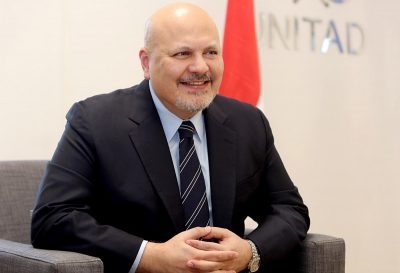Israel: Election of New ICC Prosecutor Raises Questions for War Crimes Probe
Israeli officials have welcomed the appointment of the UK's Karim Khan to head the organisation

All Global Research articles can be read in 27 languages by activating the “Translate Website” drop down menu on the top banner of our home page (Desktop version).
***
The election of Karim Khan, a British lawyer, as chief prosecutor of the International Criminal Court (ICC), has once more raised the spectre of “politicisation” in the organisation, as well as concerns about what the new appointment will mean for the probe into alleged Israeli and Hamas war crimes.
The 50-year-old, who had previously led a UN probe into crimes by the Islamic State group (IS) in Iraq, was elected by secret ballot on Friday after ICC member states failed to come to a consensus on a replacement for his predecessor, Fatou Bensouda.
The vote, which was unprecedented in the organisation’s 23-year history, saw Khan narrowly beat Ireland’s Fergal Gaynor.
There have been reports in Israel’s press that Israeli officials “supported Khan’s candidacy behind the scenes” and saw his election as a victory for Israel, despite the country not being a member of the ICC.
Khan is likely to feel particular political pressure from Israel after the ICC announced in early February that it had jurisdiction to investigate alleged war crimes by Israelis and Palestinians in the besieged Gaza Strip and the occupied West Bank and East Jerusalem.
The ICC investigation was greenlit by Bensouda, and it is not yet clear what Khan’s stance on the probe will be.
“The new ICC chief prosecutor must ignore the inevitable political pressures to abandon any potential formal investigation into allegations of war crimes committed in the territories occupied in 1967 by any party,” Chris Doyle, director of the Council for Arab-British Understanding, told Middle East Eye.
“The issue should be determined on the basis of law and evidence. There is no evidence to indicate that Karim Khan will do anything but that.”
An ‘antisemitic’ probe?
The opening of the war crimes probe was greeted with fury by Israeli officials, who denounced it as “antisemitic”.
The investigation will look into abuses committed during the 50-day war in June 2014, which saw 2,251 Palestinians killed – the vast majority of them civilians – and 74 on the Israeli side, most of them soldiers.
It comes after a five-year preliminary ICC probe.
In the wake of early February’s announcement, Israeli Prime Minister Benjamin Netanyahu lamented that a “court established to prevent atrocities like the Nazi Holocaust against the Jewish people is now targeting the one state of the Jewish people”.
“When the ICC investigates Israel for fake war crimes, this is pure antisemitism,” he said.
Bensouda, who oversaw the opening of the Gaza probe, has been a particular target of vitriol by Israel. The Trump administration sanctioned her in solidarity with Israel’s dismay over the ICC probe.
In December 2019, pro-Netanyahu Israeli newspaper Yedioth Ahronoth published an article titled “The devil from Gambia and the prosecutor from Hague”, in which it attempted to implicate Bensouda in crimes committed by former Gambian ruler Yahya Jammeh.
Israel Hayom, another right-wing daily, accused her of becoming “willingly ensnared” in the “exploitation of the international judicial system to implement the diplomatic goal of destroying the State of Israel”.
Israeli minister Yuval Steinitz in May 2020 said Bensouda held a “typical anti-Israel stance” with regards to the ICC and was determined to “harm the state of Israel and tarnish its name”. While in February, former Israeli ambassador to the UN Danny Danon accused her of “ignoring countries who carry out horrific human rights abuses”.
“If anyone should be on the stand it should be ICC Chief Prosecutor Fatou Bensouda,” he tweeted.
So far, Khan’s appointment has been greeted warmly by a number of Israeli politicians.
MK Michal Cotler-Wunsh, Israel’s top parliamentary legislator dealing with ICC issues, said Khan harboured the “potential for the ICC to fulfil its important mission – to uphold, promote and protect the rights of all those needing its representation as a court of last resort”.
Israel Hayom reported that Khan’s election could even “lead officials in Jerusalem to reconsider boycotting the ICC”.
Others are less optimistic. Officials speaking anonymously to Israel Hayom said that Khan would still have to be “examined by his actions”.
“The fact that the others were bad does not mean that his choice is good,” they said.
‘A political tool’
With Khan taking over Bensouda’s role officially in June, it still remains to be seen whether he will follow his predecessor’s path and maintain the probe, or bow to political pressure.
The ICC has regularly faced criticism since it came into existence in 1998 for seeming to overwhelmingly focus on developing countries in Africa while doing little to hold more powerful states to account.
The success or failure of a formal investigation into the Gaza war could end up making or breaking the organisation’s credibility.
“A formal investigation should be announced and pursued vigorously and fairly. Holding all parties accountable for their actions is vital. It is the most effective way of ensuring that such crimes do not get permitted in the future,” said Doyle.
“A failure to do so will render the ICC in the eyes of many as merely a political tool of the major powers rather than the place of justice and accountability for those who have access to none.”
Featured image courtesy of Middle East Eye

